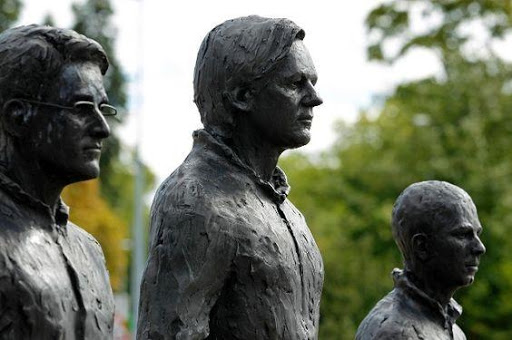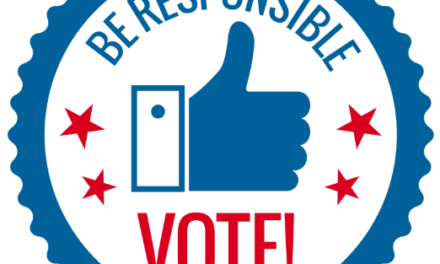“To learn who rules over you, simply find out who you are not allowed to criticize,” wrote French enlightenment philosopher Voltaire.
A thought-provoking concept given that May 3rd was World Free Press Day, significant for Americans boasting a U.S. Constitution that guarantees free speech and press, whose role it is to monitor centers of power and keep the public informed. Freedom of speech, the right to speak freely and express our thoughts while alive represent the very dignity of what being a human being is. And without free, independent journalism as the foundation of our society, democracy is crippled.
Yet, according to PBS Independent Lens, only five corporations own the thousands of newspapers, magazines, radio stations, TV stations and publishers around the world. This concentration of power negatively impacts democracy by constricting the view of the world to the interests of those who seek to maintain power. That is why non-corporate news funded by the public are essential and why free speech advocates and journalists support Wikileaks, the 100% crowd-funded publishing organization created in 2007 by Australian native Julian Assange.
Assange studied Mathematics, Physics and Quantum Mechanics in college and saw the potential for the fields to impact social justice. According to the 2011 publication, “Julian Assange – the Unauthorized Autobiography,” Assange says, “It was becoming obvious to me, that we needed mechanisms – brand new ways – to take the fruits of science and implement them for the common good. Not for the service of particular agencies, but for truth itself… I shared the view with a handful of computer scientists around the world that quantum mechanics offered a methodology for understanding justice,” (Assange, 2011, p. 111). “By using our technology to understand why certain material was kept out of the public domain, and then devoting ourselves as publishers to making that material public, we could subvert the meaning of Orwell’s words (“Who controls the past, controls the future. Who controls the present controls the past” “Big Brother is Watching You”) and turn them into a message of hope. Who would control the future? All of us,” (Assange, 2011, p. 122). Assange designed the site to ensure anonymity of whistleblowers who share original source material published in full searchable format without the filter and interpretation of corporate journalists. This help ensure an accurate record of history is unfiltered by monied interests from the world’s five mass media owners.
Since its inception in 2007, the motto of Wikileaks has been, “If wars can be started by lies, peace can be started by truth… (they serve) the public interest, to the ending of wars, by supplying journalists with the means to keep a check on the excesses of power” (Assange 2011, p. 195). Wikileaks securely houses 10 million documents and has a pristine record of publishing accuracy (zero retractions), dwarfing all media entities combined. Publications help to expose global corruption, which has led to multiple prestigious international human rights and journalism awards. Wikileaks has received nine years of consecutive nominations for the Nobel Peace Prize. Assange himself was the runner-up for Time Magazine’s Person of the Year award in 2010. And yet today he rots in a London prison for doing his job as a journalist, vilified by government officials who treat him as an enemy of the state. Why? Here are two possible reasons.
First, in 2010, Wikileaks released a video showing American soldiers indiscriminately killing Iraqi civilians and two Reuters journalists, which are classified war crimes. The video was leaked by then U.S. Army private Bradley Manning (now known as Chelsea). The U.S. responded by detaining Manning without trial for over 1,000 days before being found guilty in 2013 and given a 35-year sentence. U.S. politicians began calling Wikileaks a terrorist organization, pressuring allied countries to detain Assange and prevent Wikileaks from operating in their territories. There was also a financial blockade by private banking companies to block contributions to Wikileaks.
Second, politics. When Wikileaks was exposing the Republicans, Democrats loved it. But after publishing emails exposing the DNC, some blamed Wikileaks for Trump’s win. This, despite damning DNC emails demonstrating collusion between the DNC, Clinton and the corporate mass media which propped up Trump as a serious candidate. He could have easily gone the way of other celebrity candidates (see Kid Rock, Roseanne Barr and Howard Stern), but no. The leaks also showed a concerted effort to dismiss the popular candidacy of Senator Bernie Sanders, confirming the media and the DNC (officially, a corporation, not an actual functional organization promoting democracy), lied to the public, utilizing propaganda and stealing votes from its own constituents. If what happened in the 2016 elections were to happen in any other country and the winner was disliked by Washington, history pretty much predicts what would happen.
[subheading here] The State Responds
The price for giving the masses a safe channel to have their voices heard? Personal attacks meant to detract from relevant information shared in publications. Assange has been accused of being an anti-Semite, a rapist, a pedophile, a Russian operative. It’s an old tactic from a political playbook used throughout history against dissidents. Daniel Ellsberg, the most famous American whistleblower, lived through this. Ellsberg, a U.S. marine and military analyst in the 60s, was responsible for releasing the “Pentagon Papers” in 1971, which helped end the Vietnam War by informing the public of what was happening throughout Southeast Asia. Vilified and hunted, he was accused of being a Russian operative and called “the most dangerous man alive” by Richard Nixon. Yet given the lapse of time and general disdain for the Vietnam War, he is celebrated today for his exceptional moral courage, which continues to this day. Ellsberg has been on the Wikileaks advisory board since its 2007 inception and found the attacks on Assange familiar, stating, “EVERY attack now made on Wikileaks and Julian Assange was made against me and the release of the Pentagon Papers at the time…It’s a very serious assault on the First Amendment, clearly an attempt to rescind freedom of the press,” (Institute for Public Accuracy).
In 2012, the UK Supreme Court ordered Assange extradited to Sweden over alleged sexual assault allegations (a classic playbook tactic), which Assange vehemently denied. Fearing persecution from the U.S., Assange requested and was granted asylum by Ecuador by then president Rafael Correa. Living in the Ecuadorian embassy in London for seven years, he became an Ecuadorian citizen, writing and publishing multiple books promoting “transparency for the state, privacy for the individual.” He supported international groups fighting for transparency, justice and peace and was interviewed remotely by groups from around the world. Yet his time at the embassy was not easy – access to sunlight was denied, he had no privacy and during the last few months of his asylum heating and internet access were cut off and he was denied visitors. The U.S., under both Presidents Obama and Trump, pressured the UK to violate asylum law and multiple United Nations rulings related to his case. Sexual assault charges were dropped in 2017 but Assange remained in the embassy due to fears of being extradited by the U.S.
In 2017, after years of cruel and degrading imprisonment, Chelsea Manning was released by outgoing President Obama. Yet last month, the Trump Administration summoned her to speak to a grand jury about the 2010 leaks and against Assange. She refused and was put back in prison. Many viewed this as a first step in building a case to extradite Assange to the U.S. Ecuador’s new president, Lenin Moreno, rescinded asylum last month, allowing Assange to be sent to a London jail where he awaits a hearing for forceful extradition to the U.S. to face charges of related to the 2010 leaks. Interestingly enough, former Ecuadorian president Rafael Correa is on record speaking to France 24, a news station accusing current president Moreno of expelling Assange in exchange for a favorable trade deal, which demonstrates how Assange has become a pawn political games of the powerful. https://www.youtube.com/watch?v=9r2akjGMV-o).
Some predict Assange will be extradited to the U.S. where he may be used as an example to journalists monitoring centers of power too closely and expose the indecency of the state. These are actions befitting of a totalitarian regime that thrives on spectacle, not an enlightened democracy, as the U.S. portends to be. Julian Assange is a political prisoner. His treatment has been internationally condemned and the ramifications of his situation threaten democracy and free press around the world. Glenn Greenwald, an independent journalist tweeted, “If the US can force the arrest and then extradite foreigners like Assange on foreign soil for publishing docs, what prevents China or Iran or, you know, Russia for doing the same to US journalists who publish secrets about them?” (4/11/19 @1:08pm, twitter).
What’s happening to Assange is not isolated. Journalists throughout the world who expose crimes of the powerful are often harassed, imprisoned and sometimes murdered. How will history remember Wikileaks and Julian Assange, the individual who had the ingenuity to create an unbreakable international forum through which to share untraceable news ignored or censored by the five corporations that tell us what to think? The case of Wikileaks and Assange can teach us a lot about ourselves and how far we really are from the principles underlying our constitution.
To support journalistic freedom, visit www.Wikileaks.com







